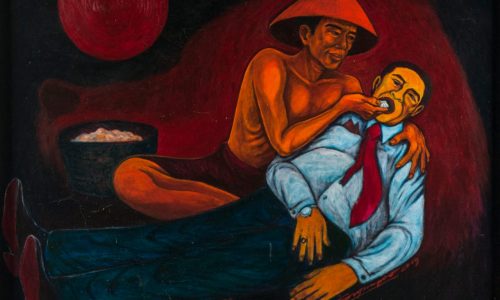A policy observer has voiced his opposition against the government’s plan to allow the private sector to use State electricity company PT PLN’s transmission and distribution network to sell their electricity, also known as Power Wheeling Policy, in the Renewable Energy Bill.
“Power Wheeling means private sector that has power reserve in Central Java, for example, can sell their electricity to Jakarta by using PLN transmission network. Based on the Constitution and the Constitutional Court ruling, the private sector cannot directly sell their electricity to costumers,” Director of Indonesia Resources Studies (IRESS), Marwan Batubara, spoke to Indonesia Business Post on Thursday, September 5, 2024.
Constitutional Court Ruling No. 001-021-022/PUU-I/2003 stipulates that in a free market mechanism, capital owners are the ones who benefit, while the community suffers the losses. Unbundling policy with open competition, including Power Wheeling scheme, is an effort to privatize electricity generation and make electricity as a market commodity.
“This could mean that the state no longer provides protection to the majority of people who live in economic deprivation,” Marwan said.
He said further that by implementing the policy, which he considers as liberal, the state actually acts unfairly and in favor of the private sector, namely giving capital owners, or even foreign investors, the opportunity to enjoy huge profits, but at the same time forcing the people to pay more expensive electricity.
In fact, the Constitution regulates that such an opportunity must be given to State-owned enterprises as holder of the monopoly rights.
The Power Wheeling scheme allows the private sector or independent power producer (IPP) to prey on PLN’s premium customers who generally need huge power and pay large electricity bills.
The Power Wheeling policy implementation is suspected to be full of moral hazard that may continue along with the construction of new and renewable energy (EBET) power plants owned by the private sector/IPP without caring about electricity oversupply, which is similar to inject the death of coal-fired power plants (PLTUs) which are economically still feasible.
“This will burden PLN’s operating costs and reduce its revenue, so that the ability to cross-subsidize the poor and the disadvantaged is reduced, while the electricity tariffs rise and the burden of state budget energy subsidies increases,” Marwan said.
Constitutional aspect
Marwan cited that the foremost reason why the Power Wheeling scheme must be rejected is because it contradicts Article 33 of the 1945 Constitution which mandates that strategic sectors concerning the people’s livelihood must be controlled by the state. In this case, the state is represented by State-owned enterprises (SOEs) as the manager.
“If the power wheeling scheme is implemented, then state control is automatically underperformed because some of it is transferred to the private sector,” he said,
Meanwhile, Constitutional Court Ruling No. 36/2012 emphasizes the role of state control over strategic sectors and the livelihood of many people through the provision that the managers of the people’s livelihoods are SOEs/PT PLN, not the private sector.
Moreover, Constitutional Court Ruling No. 001-021-022/PUU-I/2003 stipulates that the policy of separating electricity supply business with unbundling system (in Law No.20/2002) reduces the meaning of State control stipulated in Article 33 of the 1945 Constitution. “Thus, the unbundling system that contains PW scheme is also unconstitutional, and must be rejected.”
Lastly, Constitutional Court Ruling No.111/PUU-XIII/2015 stipulates that electricity business conducted competitively and unbundling is contrary to Article 33 of the 1945 Constitution. It is explained that electricity as public utilities cannot be left to the free market mechanism, which allows decision-making based on supply and demand.
Renewable energy bill
One day after replacing Arifin Tasrif, newly appointed Energy and Mineral Resources (ESDM) Minister Bahlil Lahadalia asked officials at the ministry to accelerate the completion of the Renewable Energy Bill.
A week later, the ESDM ministry announced that the Renewable Energy Bill was ready to be passed before the end of the Joko Widodo Administration. Secretary of the Directorate General of Renewable Energy and Energy Conservation at the ESDM ministry, Sahid Junaidi, admitted that there was one pending article, related to the joint use of the transmission network, which is none other than the Power Wheeling scheme.
“We are trying to optimize this, so that the EBET Bill can be passed in this period. In the next one or two weeks,” Sahid said on Agust 26, 2024.
In a cabinet term of only two months left, speculation was rife regarding the motives behind Arifin’s replacement. Arifin is considered less than optimum in completing the agenda of incorporating power wheeling schemes into the Renewable Energy Law. Another thing is that Arifin is considered unfavorable in completing the mining licenses of religious mass organizations.
Marwan said Bahlil’s appointment can be considered as an inseparable part of the oligarchy’s consolidation before the change of government. Bahlil’s appointment is also full of conflicts of interest for the minister is also a mining entrepreneur.
Marwan expressed hope that the next president Prabowo Subianto will be willing and able to end this harmful oligarchic agenda, in particular the Power Wheeling scheme, which not only violates the Constitution and the regulations, but also its the implementation will harm the state finances and SOEs, and ultimately increase the burden on the people’s cost of living.









